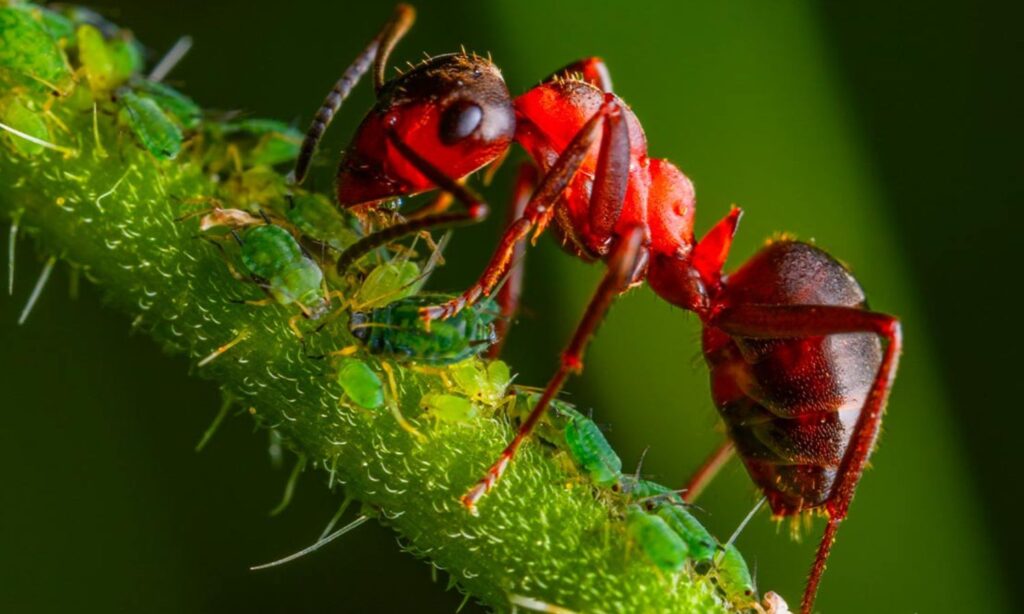Dreams have long been a source of fascination, and in biblical times, they were seen as powerful forms of divine communication.
Dreams often carried messages of guidance, warnings, and spiritual insight. Among the many symbols that can appear in our dreams, red ants hold significant biblical meaning.
These tiny creatures, often seen working diligently in groups, may symbolize something much larger in the context of dreams.
In this blog post, we will explore the biblical meaning of red ants in dreams, unpack the symbolism of ants in scripture, and learn how to interpret dreams involving red ants to gain deeper insight into personal growth and spiritual discernment.
Biblical Foundations: Understanding Dreams in Scripture
Dreams are not just random images or symbols that our subconscious mind generates. In the Bible, dreams were often viewed as divine guidance, a means of communication from God to His people.
For example, Joseph and Daniel are two prominent figures in scripture who interpreted dreams that shaped the course of their lives and the history of Israel.
Joseph’s Dream Interpretations
Joseph, the beloved son of Jacob, was known for his ability to interpret dreams, a gift he used to bring divine understanding to others. In Genesis 41, Joseph interprets Pharaoh’s dream, which foretells a coming famine.
Through his ability to interpret dreams, Joseph not only saved Egypt but also reunited with his family.
Joseph’s story underscores how biblical dream interpretation can offer valuable insight into the future, and sometimes, divine warnings or directions.
Daniel: The Dream Interpreter
Similarly, Daniel, a prophet in the Old Testament, was gifted with the ability to interpret dreams and visions.
In Daniel 2, he interprets Nebuchadnezzar’s troubling dream, offering not only a solution to the king’s distress but also a prophetic vision of the future.
Dreams, in biblical times, were powerful messages, often warning of future events, and offering direction, much like the symbols we encounter in dreams today.
Ants in Biblical Context: Wisdom and Diligence

Proverbs 6:6-8 – Lessons from the Ant
The Bible often uses animals and insects to convey wisdom. One of the most notable references to ants is found in Proverbs 6:6-8, which says:
“Go to the ant, you sluggard; consider its ways and be wise! It has no commander, no overseer or ruler, yet it stores its provisions in summer and gathers its food at harvest.”
This passage invites us to reflect on the ant’s diligence and industriousness. Despite its small size, the ant embodies hard work, foresight, and preparation.
The Bible teaches that we can learn important lessons from the humble ant, such as the value of self-discipline and the need to be proactive in our own lives.
In the context of dream interpretation, ants can symbolize these same virtues—diligence, industriousness, and preparation. The red ant, with its vibrant color, may also point to deeper, more urgent issues requiring attention.
The Color Red in the Bible: A Symbol of Sacrifice and Warning
The color red is rich with symbolism in the Bible. Most notably, it is associated with sacrifice and redemption through the blood of Jesus.
The Bible often uses colors to communicate deeper meanings, and red frequently represents both the urgency of a situation and the passion or anger associated with it.
The Color of Blood and Redemption
In scripture, the blood of Christ is central to the concept of redemption. Red, in this context, represents not only the sacrifice of Jesus but also the spiritual renewal and atonement that comes with it. For instance, in Matthew 26:28, Jesus says:
“This is my blood of the covenant, which is poured out for many for the forgiveness of sins.”
When red ants appear in dreams, their color could symbolize urgent matters related to personal sacrifice, spiritual renewal, or pressing emotional issues that need immediate attention.
Red Ants as Spiritual Symbols

Given the red color’s strong associations with sacrifice and urgency, red ants in dreams might also signal that the dreamer needs to confront a situation or emotion that requires prompt action.
These tiny creatures, though seemingly insignificant, can represent a larger spiritual message, urging you to address urgent emotional states, such as anger or unaddressed frustration.
Red Ants in Dreams: What Do They Represent Biblically?
The Power of the Swarm
Red ants, like all ants, are known for their collective nature. They work together in colonies, exhibiting extraordinary teamwork and diligence.
Biblically, ants represent these very virtues persistence, teamwork, and community. In dreams, red ants may symbolize that you need to rely on others for support, or that it’s time to tackle a large issue by breaking it down into manageable tasks.
Ant Bites: A Wake-Up Call
Dreams of ant bites, particularly red ants biting you, might indicate that small problems are starting to have a larger impact.
In biblical interpretation, the bite of an ant could symbolize a warning sign of something small, but persistent, that needs your attention.
It could also indicate that you are feeling overwhelmed by minor stresses that have accumulated over time.
Ants in Conflict: A Spiritual Battle
At times, ants in dreams could represent spiritual struggles or challenges that need to be confronted.
The red color of the ants may intensify this symbolism, suggesting that the conflict is urgent and requires immediate resolution.
If you find yourself killing red ants in a dream, it could suggest that you are actively trying to remove something negative or disruptive from your life, perhaps an emotion or a situation that is hindering your spiritual growth.
Real-Life Dream Scenarios: Case Studies of Red Ant Dreams

Positive Dream Experiences
Some individuals have reported dreams involving red ants that symbolize positive outcomes.
For instance, in one case, a person dreamed of a swarm of red ants working together to build something, which was interpreted as a sign of personal growth and teamwork in their waking life.
This dream was seen as a sign to embrace collective efforts and acknowledge the hard work being put into long-term goals.
Negative Dream Experiences
On the other hand, dreams of red ants biting or swarming around the dreamer can represent the accumulation of small issues that, if left unchecked, can lead to greater challenges.
In one example, a person dreamed of red ants crawling on their body and biting them repeatedly.
This was interpreted as a warning to pay attention to unresolved issues, particularly emotional states such as anger or stress, that could soon escalate if not dealt with.
How to Apply Biblical Interpretations to Your Life
Reflecting on Personal Struggles and Strengths
When interpreting dreams of red ants, consider your emotional states and personal circumstances.
Are there areas in your life where you have been neglecting responsibility or avoiding important tasks? The diligence of ants may be a reminder to take action and focus on these neglected areas.
Similarly, if you feel overwhelmed by small problems, it may be time to address them before they grow larger.
Using Prayer and Meditation for Clarity

Prayer and meditation are powerful tools for seeking divine guidance in understanding your dreams.
By reflecting on the symbolism of red ants, you can ask for insight into the spiritual lessons they carry.
As you pray for clarity, allow yourself time to meditate on the feelings and circumstances in your life that may be reflected in your dream.
Freqeuntly Asked Questions
What is the spiritual meaning of dreaming about red ants biblically?
Dreaming about red ants biblically may symbolize urgency, diligence, and emotional struggles that need to be addressed.
What happens when red ants come in a dream?
Red ants in a dream could indicate small, persistent issues or emotional unrest that require attention before they grow larger.
What do red ants represent spiritually?
Spiritually, red ants represent hard work, teamwork, diligence, and sometimes emotional urgency or passion.
What do ants represent biblically?
Biblically, ants represent wisdom, diligence, and self-discipline, as seen in Proverbs 6:6-8.
What does God say about ants in the Bible?
God uses ants in the Bible to teach lessons of hard work, preparation, and industriousness as found in Proverbs 6:6-8.
What does it mean to see ants in your dream?
Seeing ants in a dream may symbolize organization, effort, or small issues that require resolution.
What is the biblical lesson from ants?
The biblical lesson from ants is about diligence, preparation, and the importance of working hard even without supervision (Proverbs 6:6-8).
Are ants a good or bad omen?
Ants are generally seen as a positive omen, symbolizing hard work and wisdom, but they may also warn of small problems that need attention.
What is the significance of the ant in Proverbs?
In Proverbs, ants symbolize wisdom, industriousness, and the value of working hard and planning ahead for future needs.
Conclusion
In the Bible, dreams served as a divine guide—offering wisdom, warnings, and insight. Red ants, with their powerful symbolism of diligence, sacrifice, and urgency, provide valuable lessons for modern-day dreamers.
By reflecting on the meaning of red ants in dreams, you can gain clarity about your own life challenges and emotional states.
When you dream of red ants, remember to consider the symbolic meanings of their actions, the color red, and the personal emotions or spiritual discernment that may be connected to the dream.
Use these insights to take proactive action, seek divine wisdom, and embark on a path of personal growth.
Let your dreams be a source of spiritual guidance, leading you to deeper introspection, wisdom, and, ultimately, self-improvement.











